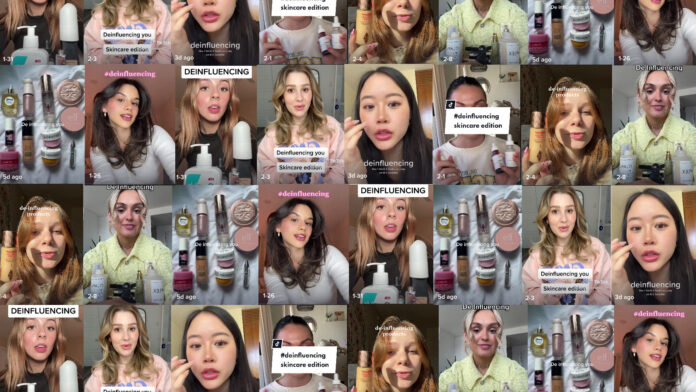
Influencers on Tiktok are starting to be held to consumption standards that are threatening their engagement. “Starting from January 2023 a new TikTok trend has become popular: #deinfluencing. If searching TikTok for this hashtag (which counts over 264 million views), one can see videos aimed at challenging the hype about specific products (especially fashion and make-up products) and criticising the large number of consumer goods purchased as a result of influencers’ recommendations and TikTok trends” (Bainotti, 2023).
Influencers are being “cancelled” for their continued indulgence in consumption culture. Deinfluencing “represents a broader critique of the influencer economy and its functioning, in particular its reliance on consumerism and the display of overconsumption, fuelled by platforms’ economies of visibility (Banet-Weiser, 2012). Research shows that influencers’ practices are deeply rooted in consumption (Abidin, 2016; Abidin & Gwynne, 2017) and that the display of consumer goods represents a way to gain micro-celebrity (Marwick, 2015) and social status” (Bainotti, 2023).
But isn’t criticizing one way of influencing just another form of influencing?
Deinfluencing “largely relies on consumption practices; a criticism of the influencer industry via crafting and boosting a personal brand; and an opposition to the logic of TikTok by using that same logic for personal gains” (Bainotti, 2023).
So can “deinfluencing” really be a form of resistance if they are constricting their voice to the same platforms that encourage influencing? And if resistance is trending, is it really resistance or just a new version of the “influencer”?
Tiktok focuses on “promoting forms of ephemeral consumption (Caliandro et al., forthcoming), meaning consumption practices that last for the duration of the latest trend and are then immediately supplanted by the next, popular challenge to replicate” (Bainotti, 2023). This makes the “deinfluencing” trend on Tiktok a form of ephemeral consumption and it “can be considered a way to get visibility, outsmart the algorithm, and join imitative publics” which can actually reduce the effectiveness of the movement against consumption as the movement itself relies on consumption (Bainotti, 2023).
In an ideology, deinfluencing represents the “refusal of the aspirational lifestyle promoted by both the influencer industry and TikTok, as well as the need for new ways of self-expression that go beyond the mere adherence to a pre-defined lifestyle rooted in consumption” (Bainotti, 2023).
The idea of deinfluencing goes hand in hand with creating a form of sustainable financial well-being that can last from the present to the future as our current rate of consumption is unsustainable on a global scale. But deinfluencing using Tiktok is potentially harmful to the movement itself, so are there alternative technologies that can help this revolution against consumerism? If so, how can design use inspiration from the ideologies and tactics of deinfluencing trends to help consumers better understand their own personal finances and what they need for their personal well-being?
References:
Bainotti, L. (2023). TRENDING RESISTANCE: A STUDY OF THE TIKTOK #DEINFLUENCING PHENOMENON. The 24th Annual Conference of the Association of Internet Researchers. https://spir.aoir.org/ojs/index.php/spir/article/view/13392/11514
Skidelsky, M. [@michelleskidelsky]. (2023 February 7). my bank account hates me, save yours while you can #deinfluencing [Video]. Tiktok. https://www.tiktok.com/@michelleskidelsky/video/7197509354889792774?lang=en



